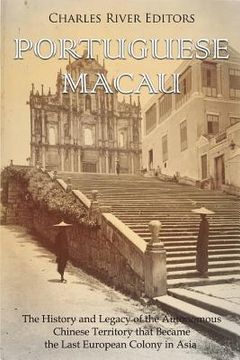Portuguese Macau: The History and Legacy of the Autonomous Chinese Territory that Became the Last European Colony in Asia (en Inglés)
Reseña del libro "Portuguese Macau: The History and Legacy of the Autonomous Chinese Territory that Became the Last European Colony in Asia (en Inglés)"
*Includes pictures *Includes contemporary accounts *Includes online resources and a bibliography for further reading The Portuguese explorer Jorge Álvares visited the Chinese coast in 1513 and was the first European to do so via the sea. Shortly after, more Portuguese visited around the Tunmen Inlet, which is believed to have been somewhere around the Pearl River Delta, and an establishment was set up there in 1514. At this time the Chinese knew nothing of the Portuguese other than their violent takeover of Malacca, a tributary to the Chinese Empire, so the Portuguese were treated with caution. In 1516, Rafael Perestrello was dispatched from Malacca to the islands of Guangdong where his people were well received. Due to this favorable reception, more ships and trading vessels were sent the following year under the command of Perez de Andrade. The fleet anchored on the island Shang-chuan and was at first viewed with suspicion, given the frequent raids from Japanese pirates around the Guangdong region. However, Andrade was peaceful in his dealings with the Chinese and the Chinese allowed two of his ships to proceed to Guangzhou (Canton), while the others returned to Malacca or sailed up the coast with Chinese junks to other merchant factories. The peaceful interactions with the Portuguese was not to last for very long thanks to Andrade's brother, Simão de Andrade, also known as Simon (Brinkley 1904: 170-142). The Portuguese fleet that arrived in 1518 under the command of Andrade's brother quickly turned to piracy, and the diplomatic relations between the Chinese and Portuguese deteriorated. At the time, an envoy was in Beijing, where they had been peacefully welcomed, but after hearing news of the actions of Portuguese (led by Simão de Andrade), the Chinese demanded of the visiting envoy that the Portuguese leave Malacca (since it was a tributary of China). The envoy refused and was thrown in prison, where one of the Portuguese diplomats was executed. The rest of the envoy was eventually shipped off to prison in Guangzhou. The Portuguese would have completely lost their foothold in China were it not for the corruption and bribery that saturated the administrative system in Guangzhou (Smith 1920: 9). Despite the laws and regulations regarding dealings with foreigners, by 1537 three settlements had been established in the nearby region: Shang-chuan, Lang-peh-kao (Lampaçao), and Macau, which was established entirely on lies told to the Chinese. The Portuguese had told officials that tribute to the Chinese (which was in fact normal trading goods) had become wrecked in storms and needed to be dried. The Portuguese were allowed to erect sheds and structures for this purpose at Macau, but numerous merchants established themselves as tenants there and managed to pay the Chinese a yearly rent of 500 ounces of silver. The location of Macau was beneficial and strategically chosen by the Portuguese, as it was in close communication with Guangzhou and connected via a river system. In contrast to their earlier dealings with the Chinese, the Portuguese attempted to appear more humble and comply with the wishes of the Chinese rather than with force. As it turned out, the policy, in conjunction with increased European activities in the region, would help the Portuguese Empire hold on to Macau even as its fortunes dwindled everywhere else across the world. Portuguese Macau: The History and Legacy of the Autonomous Chinese Territory that Became the Last European Colony in Asia examines how this tiny foothold managed to last as a European possession for so long, and the dynamics that led to China establishing sovereignty over it at the end of the 20th century. Along with pictures depicting important people, places, and events, you will learn about Macau like never before.

